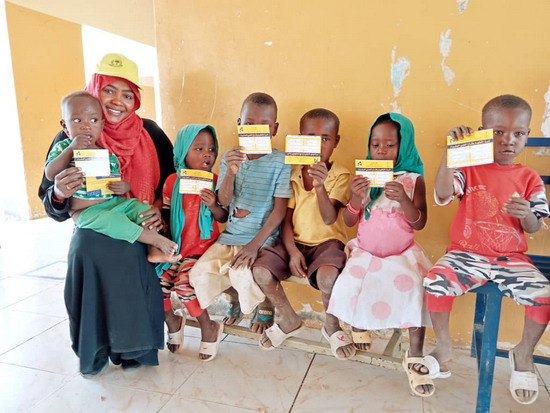 Sudanese authorities carried out an oral cholera and yellow fever vaccination campaign among Ethiopian refugees at Hamdayeet reception centre, Kassala State, from 23 to 26 March 2021
Sudanese authorities carried out an oral cholera and yellow fever vaccination campaign among Ethiopian refugees at Hamdayeet reception centre, Kassala State, from 23 to 26 March 2021
27 April 2021 – Health authorities in Sudan began implementing yellow fever vaccination campaign activities last month in priority states as part of a broader vaccination campaign against yellow fever, cholera and polio targeting 100 000 people, including host communities and recently arrived Ethiopian refugees.
Last month, over 77 000 Ethiopian refugees were reached with yellow fever and cholera vaccines in Kassala and Gedaref states in the eastern part of Sudan through fixed and temporary sites and mobile vaccination teams. Networks of community volunteers were also established to raise community awareness of yellow fever and cholera symptoms, transmission and preventive measures. Since the beginning of the conflict in the Tigray region of northern Ethiopia in November 2020, 63 000 Ethiopian refugees have arrived in Kassala and Gedaref states,1 fleeing the increasing levels of violence in their country. Additional outreach and vaccination activities are currently under way in other states, including catch-up vaccinations campaigns for children in host communities.
These activities are being carried out by the Federal Ministry of Health and supported by WHO, UNICEF and Gavi, the Vaccine Alliance, in line with the "WHO Global Strategy to Eliminate Yellow Fever Epidemics, 2017–2026".
Sudan is at high risk for the spread of yellow fever due to a combination of climatic and ecological factors, and because there are still areas of low population immunity. Sudan has a high presence of the Aedes aegyptai mosquito that can transmit yellow fever to human populations. The risk of yellow fever is also particularly high in neighbouring countries, such as Chad, Central African Republic, Ethiopia, Eritrea and South Sudan, and is exacerbated by cross-border population movement. These factors have previously resulted in at least 4 recent outbreaks of yellow fever in Sudan, which is the only country in WHO's Eastern Mediterranean Region in the yellow fever zone.
There is currently no treatment for yellow fever although proper care management to treat dehydration, fever, and liver and kidney failure improves survival rates. Vaccination remains the most important measure for preventing this fatal disease. One single dose of the yellow fever vaccine offers lifetime protection.
In the last few years, Sudan has strengthened its commitment to assuring equitable access to vaccination, and includes refugees, migrants and displaced communities in its vaccination campaigns under an innovative approach. By organizing multi-antigen vaccination campaigns, including for yellow fever, health authorities have efficiently reached populations in need and reduced their risk of becoming ill with preventable diseases.
Protecting its populations against yellow fever has always been a public health priority for Sudan. In 2019, after a 5-year nationwide campaign, health authorities successfully reached more than 30 million people from 9 months to 60 years of age living in Sudan’s 18 states with the yellow fever vaccine.
This year, Sudan plans to introduce the yellow fever vaccine into its national immunization schedule as per WHO recommendations that all endemic countries should do so. This is a remarkable achievement given the ongoing challenges of the COVID-19 vaccination roll-out and other public health activities, including circulating vaccine derived polio virus type 2.
On the eve of World Immunization Week, celebrated during the last week of April every year, Sudan demonstrates how investing in vaccines and routine immunization brings us closer to ending diseases like yellow fever, especially among populations most at risk.
The "Global strategy to eliminate yellow fever epidemics" has been developed by a coalition of partners (Gavi, UNICEF and WHO) to address yellow fever’s changing epidemiology, resurgence of mosquitoes and the increased risk of urban outbreaks and international spread. This global, comprehensive long-term strategy (2017–2026) targets the most vulnerable countries, while addressing global risks, by building resilience in urban centres and preparedness in areas with the potential for outbreaks and ensuring a reliable vaccine supply.
Related links
WHO Global strategy to eliminate yellow fever epidemics
1 Data from UNHCR: Ethiopia emergency situation: arrivals update| Kassala and Gedaref, 24 April 2021





